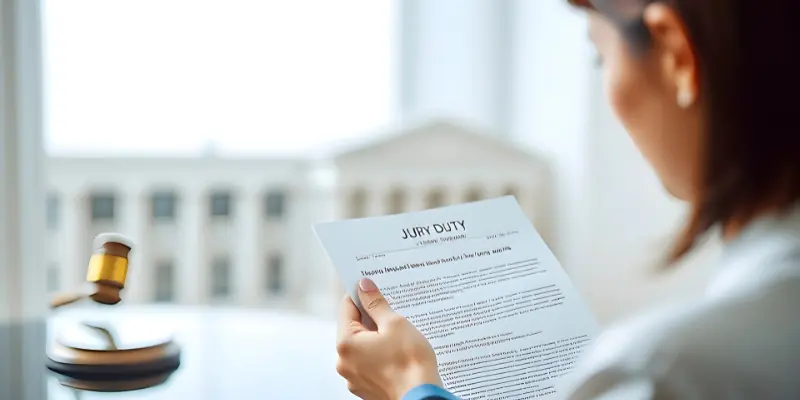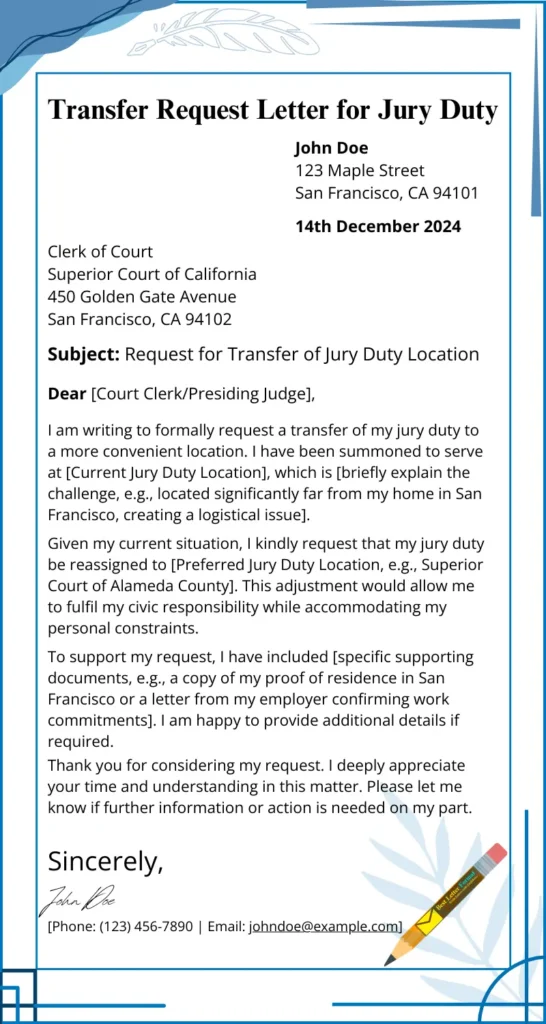How to Write a Transfer Request Letter for Jury Duty: A Simple Guide
Published: 18 Dec 2024

Writing a transfer request letter for jury duty can feel overwhelming, especially if you’re unsure how to craft it professionally. Whether it’s due to personal obligations, work conflicts, or location issues, knowing the right way to present your request can make all the difference.
This guide is here to help! We’ll walk you through the steps to write a clear, concise, and effective transfer request letter that ensures your message is heard. If you’re also looking for tips on writing impactful letters to judges for any reason, check out this comprehensive resource: How to Write a Letter to a Judge. By the end, you’ll feel confident about addressing the situation while maintaining professionalism.
Let’s get started!
1. Example of a Professional Transfer Request Letter for Jury Duty
If you’re unsure how to structure your transfer request letter for jury duty, here’s a clear and professional example to guide you. This sample covers all the essential elements, ensuring your request is polite, concise, and effective.
John Doe
123 Maple Street
San Francisco, CA 94101
December 18, 2024
Clerk of Court
Superior Court of California
450 Golden Gate Avenue
San Francisco, CA 94102
Subject: Request for Transfer of Jury Duty Location
Dear [Court Clerk/Presiding Judge],
I am writing to formally request a transfer of my jury duty to a more convenient location. I have been summoned to serve at [Current Jury Duty Location], which is [briefly explain the challenge, e.g., located significantly far from my home in San Francisco, creating a logistical issue].
Given my current situation, I kindly request that my jury duty be reassigned to [Preferred Jury Duty Location, e.g., Superior Court of Alameda County]. This adjustment would allow me to fulfil my civic responsibility while accommodating my personal constraints.
To support my request, I have included [specific supporting documents, e.g., a copy of my proof of residence in San Francisco or a letter from my employer confirming work commitments]. I am happy to provide additional details if required.
Thank you for considering my request. I deeply appreciate your time and understanding in this matter. Please let me know if further information or action is needed on my part.
Sincerely,
John Doe
[Phone: (123) 456-7890 | Email: johndoe@example.com]

“Fulfilling your civic duty is not just an obligation—it’s a chance to contribute to justice and fairness in society.”
— Anonymous
2. How to Write a Step-by-Step Transfer Request Letter for Jury Duty
Writing a professional transfer request letter for jury duty can feel challenging, but breaking it down into simple steps makes the process much easier. Here’s a detailed guide with each section explained to ensure your letter is clear, professional, and effective.
Step 1: Add Your Contact Information
Start your letter with your personal details to make it easy for the court to contact you if needed. Include:
- Your Full Name
- Address (Street, City, State, ZIP Code)
- Phone Number and Email Address
Why It Matters: Including your contact information upfront ensures the court knows who you are and how to reach you.
Step 2: Mention the Date
Write the date below your contact information in a standard format like Month Day, Year (e.g., December 18, 2024).
Why It Matters: The date establishes a record of when you submitted your request.
Step 3: Address the Court Official
Next, address the letter to the appropriate authority. Use their official title, such as:
- Clerk of Court
- Presiding Judge
Include the court’s name and address, such as:
- Superior Court of California
450 Golden Gate Avenue
San Francisco, CA 94102
Why It Matters: Properly addressing the recipient ensures your letter reaches the correct person or office.
Step 4: Use a Clear and Relevant Subject Line
Make your purpose obvious with a concise subject line. For example:
- Request for Transfer of Jury Duty Location
Why It Matters: A clear subject line helps the court quickly identify the purpose of your letter.
Step 5: Write a Polite Introduction
Begin your letter with a respectful opening and clearly state your reason for writing. Mention:
- Your current jury duty location and date.
- The reason for the transfer request, such as:
- Work commitments.
- Personal obligations.
- Distance or transportation issues.
Example:
“I am writing to formally request a transfer of my jury duty, originally scheduled at [Current Location], due to [specific reason].”
Why It Matters: A concise introduction sets a professional tone and provides immediate context.
Step 6: Explain the Reason in the Body
This is the main part of the letter where you provide details supporting your request:
- Explain why the current location is inconvenient (e.g., distance, personal obligations).
- Suggest a preferred alternative location.
- Mention any supporting documents you’re attaching (e.g., proof of residence).
Example:
“The current location of my jury duty is over 50 miles from my residence, making transportation difficult. I kindly request a reassignment to [Preferred Location], which is closer to my home.”
Why It Matters: A well-explained body shows the court why your request is valid.
Step 7: Conclude with Gratitude and Contact Information
End your letter politely and professionally:
- Express gratitude for their time and understanding.
- Offer to provide further information if needed.
- Include your contact details again for easy follow-up.
Example:
“I deeply appreciate your consideration of my request. Please feel free to contact me at [your phone number] or [your email address] for any further details.”
Why It Matters: A professional closing leaves a positive impression.
Step 8: Add Your Signature
Finish the letter with a formal sign-off:
- Sincerely,
- Yours truly,
Then, write your full name below it.
Why It Matters: A signature gives the letter a polished and formal look.
3. Why a Transfer Request for Jury Duty Might Be Necessary
Filing a transfer request for jury duty is often essential when unforeseen circumstances make it difficult to attend the assigned location. Here, we explore common reasons why you might need to request a transfer and the legal or procedural context that supports your request.
1. Personal Commitments
Life’s responsibilities can sometimes conflict with jury duty obligations. Common personal reasons for requesting a transfer include:
- Family Obligations: Caring for children, elderly parents, or other dependents.
- Health Issues: Medical conditions or appointments that make it challenging to attend the assigned court location.
Legal Context:
Courts often allow transfers if you can provide valid documentation, such as medical certificates or proof of caretaking responsibilities.
2. Work Conflicts
Professional commitments can also necessitate a transfer. These include:
- Inflexible Job Schedules: If attending jury duty would cause significant disruptions to your work.
- Critical Job Roles: For individuals in essential services (e.g., healthcare professionals or first responders).
How to Proceed:
Attach an employer’s letter explaining why the current jury duty location poses challenges and suggest a nearby courthouse that fits better with your work schedule.
3. Location and Transportation Issues
The assigned jury duty location may be too far from your residence or difficult to access due to:
- Excessive Commute Distance: Locations that are far from your home, causing logistical or financial burdens.
- Transportation Challenges: Lack of reliable public transport or personal vehicle issues.
Legal Context:
Most courts recognize the importance of convenience in fulfilling jury duty and may approve requests to transfer to a closer courthouse if the reason is valid and documented.
4. Other Valid Reasons
Some additional circumstances that might justify a transfer request include:
- Conflicts with Scheduled Events: Important pre-planned commitments such as exams, weddings, or business trips.
- Language Barriers: If you’re assigned to a courthouse where proceedings are conducted in a language you don’t understand.
Pro Tip:
Clearly explain your reason in the letter and attach relevant supporting documents to make your case stronger.
4. Tips for Success When Writing a Transfer Request Letter for Jury Duty
Crafting a professional and effective transfer request letter for jury duty requires attention to detail and timeliness. Follow these tips to ensure your letter is well-received and achieves its purpose.
Dos and Don’ts When Writing the Letter
| Dos: |
|---|
|
| Don’ts: |
|---|
|
The Importance of Submitting the Request Promptly
- Early submission ensures your letter is processed before your scheduled jury duty date.
- Courts may need time to verify your supporting documents and decide on the transfer, so don’t wait until the last minute.
Pro Tip: Mark important deadlines on your calendar to avoid missing submission dates.
Following Up If There’s No Response
- If you don’t receive a response within a reasonable time (e.g., one to two weeks), follow up with the court.
- Use a polite follow-up email or phone call to inquire about the status of your request.
Example Follow-Up Statement:
“I am following up regarding my transfer request for jury duty submitted on [submission date]. Please let me know if any further information or documents are required.”
Conclusion
Throughout this guide, we’ve covered everything you need to know about writing a transfer request letter for jury duty. Here’s a quick summary of what we’ve discussed:
- A real-life example of a professionally written transfer request letter, showing you exactly how to format and phrase your request.
- A step-by-step breakdown of each section of the letter, from adding your contact information to signing off professionally.
- The common reasons why a transfer might be necessary, such as personal commitments, work conflicts, or location issues, along with tips to support your case effectively.
- Practical tips for success, including what to do (and avoid) when writing your letter, submitting your request on time, and following up if needed.
If you still have questions or need help with a specific situation, feel free to ask! Drop your queries in the comments below—we’d love to assist you.
Is there another type of letter or topic you’d like more guidance on? Let us know in the comments, and we’ll create a detailed guide just for you.

- Be Respectful
- Stay Relevant
- Stay Positive
- True Feedback
- Encourage Discussion
- Avoid Spamming
- No Fake News
- Don't Copy-Paste
- No Personal Attacks

- Be Respectful
- Stay Relevant
- Stay Positive
- True Feedback
- Encourage Discussion
- Avoid Spamming
- No Fake News
- Don't Copy-Paste
- No Personal Attacks








